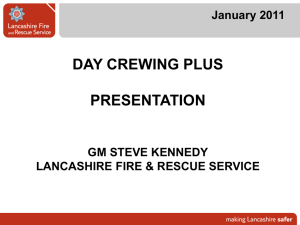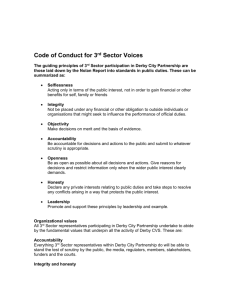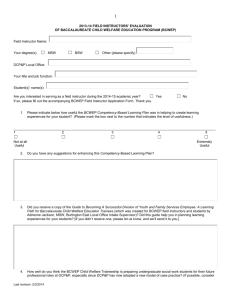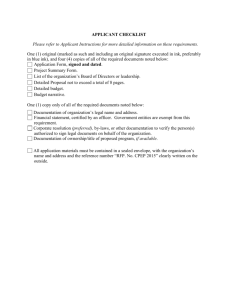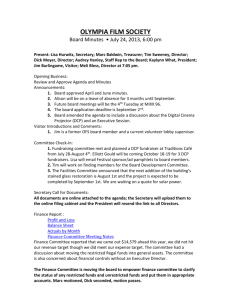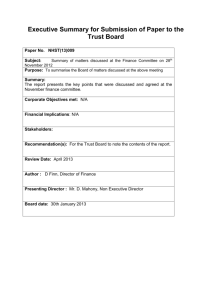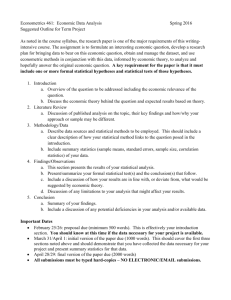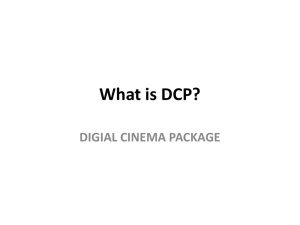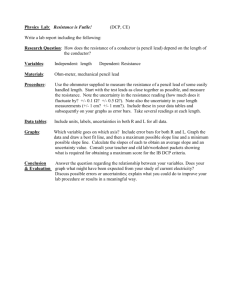Derby CVS
advertisement
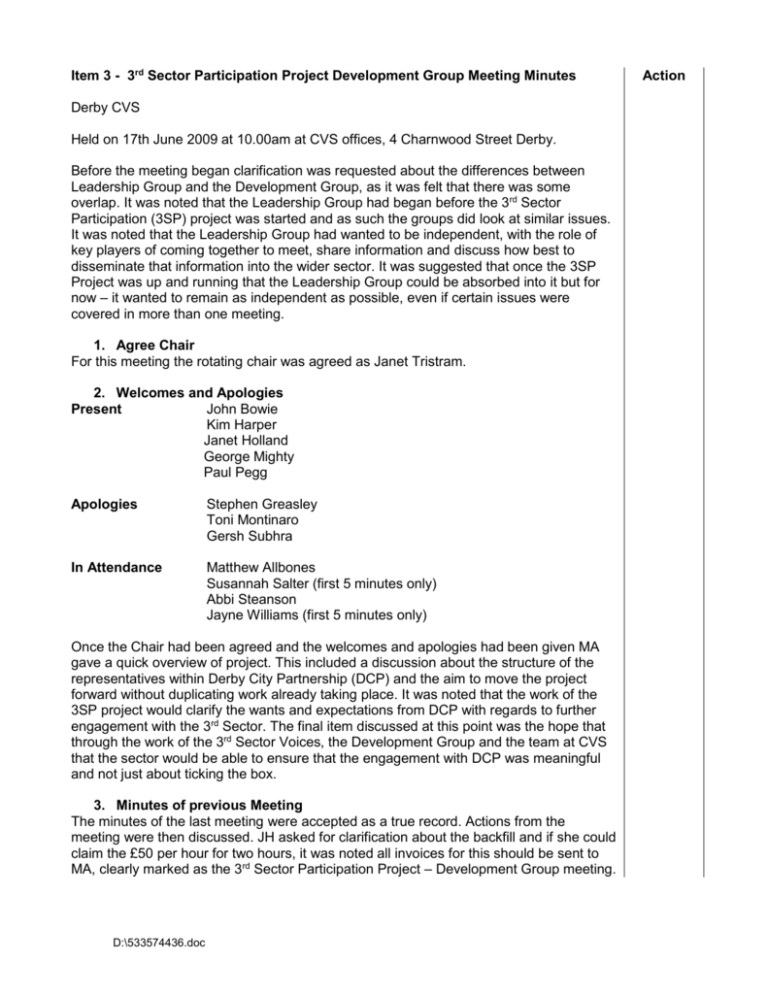
Item 3 - 3rd Sector Participation Project Development Group Meeting Minutes Derby CVS Held on 17th June 2009 at 10.00am at CVS offices, 4 Charnwood Street Derby. Before the meeting began clarification was requested about the differences between Leadership Group and the Development Group, as it was felt that there was some overlap. It was noted that the Leadership Group had began before the 3rd Sector Participation (3SP) project was started and as such the groups did look at similar issues. It was noted that the Leadership Group had wanted to be independent, with the role of key players of coming together to meet, share information and discuss how best to disseminate that information into the wider sector. It was suggested that once the 3SP Project was up and running that the Leadership Group could be absorbed into it but for now – it wanted to remain as independent as possible, even if certain issues were covered in more than one meeting. 1. Agree Chair For this meeting the rotating chair was agreed as Janet Tristram. 2. Welcomes and Apologies Present John Bowie Kim Harper Janet Holland George Mighty Paul Pegg Apologies Stephen Greasley Toni Montinaro Gersh Subhra In Attendance Matthew Allbones Susannah Salter (first 5 minutes only) Abbi Steanson Jayne Williams (first 5 minutes only) Once the Chair had been agreed and the welcomes and apologies had been given MA gave a quick overview of project. This included a discussion about the structure of the representatives within Derby City Partnership (DCP) and the aim to move the project forward without duplicating work already taking place. It was noted that the work of the 3SP project would clarify the wants and expectations from DCP with regards to further engagement with the 3rd Sector. The final item discussed at this point was the hope that through the work of the 3rd Sector Voices, the Development Group and the team at CVS that the sector would be able to ensure that the engagement with DCP was meaningful and not just about ticking the box. 3. Minutes of previous Meeting The minutes of the last meeting were accepted as a true record. Actions from the meeting were then discussed. JH asked for clarification about the backfill and if she could claim the £50 per hour for two hours, it was noted all invoices for this should be sent to MA, clearly marked as the 3rd Sector Participation Project – Development Group meeting. D:\533574436.doc Action 4. Co-ordinators Report As a copy of the report had been sent out with the papers for the meeting; it was not read word for word and only a couple of key items were pulled from it for discussion, which are reflected below: Networks A query was raised over how the invite lists for the new network meetings were being drawn up. MA explained that it was dependent on the remit of the meeting and the range of topics to be discussed. The Neighbourhood Network meeting would be made up of the neighbourhood representatives. The Women’s Network meeting would be made up of key organisations such as; Women’s Work, WRVS, The Women’s Institute and a wide range of other women’s groups. The Cultural Network meeting would include the current representatives within DCP under the Cultural banner as well as a large number of sports, faiths, arts and learning groups from across the City. The Stronger, Safer and Cleaner Network meeting was slightly more complicated as the agenda for the meeting covers many areas. With all the possible groups invited the list was an unmanageable meeting of over 200, so it was reduced to key organisations. The Growth Network meeting would be key organisations who work under the headings of; Worklessness, Environmental Issues and Social Enterprise. MA explained that these meetings would be about an hour long with an introduction to the project and an opportunity to explore if a network was needed and if so how it would operate. The decisions about the possible networks moving forward after this initial meeting would be made by the attendees. Clarification was sought over the issue of an environmental network and how it sits within DCP. Technically it is covered under the Stronger, Safer, Cleaner and Greener Communities City however work is actually being progressed under the Physical Futures group, within the City of Growth. KH noted that John Millar from DATA, had done research into the need for an environmental network, but it had struggled. It was noted that environmental agencies would be invited to the Growth Network meeting. A discussion took place around some networks being more sustainable than others, due to the importance of statutory agendas and the budgets available. It was hoped that with proper support and engagement from DCP realistic goals could be achieved. As part of the 3SP Project the want and need for the DCP cities to engage with the sector would increase and the benefits of partnership working between the two sectors would be seen. It was also noted that to do this work effectively a certain amount of money was required. An update about the networks would be brought to the next Development Group meeting. Process for Vacancies As a result of MA’s update about promoting spaces for 3rd Sector representatives within DCP, a discussion took place about the processes in place for filing vacancies. It was noted that no process had been formulated and was open for discussion. It was decided that if the situation arose where more than the minimum of two representatives wanted to D:\533574436.doc MA sit on a meeting then the chair of the meeting in question could be approached to see if there were enough spaces. It was noted that any decision to refuse more than the minimum 3rd Sector representation would come from DCP not the 3SP project. Working Group As part of the conversation about developing the 3rd Sector Board Member role description, it was decided that there were a number of items to be discussed. With regards to the election of 3rd Sector representatives to the DCP Board, it was decided that it was important the individuals in this role possessed the skills necessary to represent the sector well. This led onto the discussion about civil leadership training for representatives for which the university were very interested in running. It was decided that MA would draft a process about elections and would feed this back to the Development Group. The working group; to be made up of John Bowie, Janet Holland and Matthew Allbones; would look at the civil leadership programme, further development of the role description and the criteria the representatives would be judged against; including a minimum attendance of 50% with all reps striving to attend 75% of the meetings allocated to them. It was noted that DCP should be informed that the project would be working towards an election process. The working group would feedback to the Development Group at the next meeting. 4.1 Project Timetable Further details of the outcomes of the project were requested, AS explained that the monitoring form lists the contracted outputs for the project as well as planned activity and actual performance. The group felt it would be useful to have this information. AS noted that it would be put onto the agenda and circulated within the papers for the next Development Group meeting in July. Further details were requested about the training that was listed on the timetable. MA stated that so far the type of training discussed so far was centred on how to use the new website as well as bite size chucks about other key issues. It was noted that this would develop following the discussion about a working group for a civil leadership programme. It was noted that a working group meeting had to be scheduled before the next Development Group meeting. Staff Team & Working Group AS Staff Team 4.2 3rd Sector Role Description The role description was accepted as any suggested changes and amendments had been made, however due to the working group development, it was noted that it may change again. Working Group 4.3 Code of Conduct The code of conduct was also accepted but again may be altered to reflect selection criteria, which would be detailed by the working group. It was noted that the document had been received with the tracked changes on it. AS stated this had also happened internally and would be put right so that it did not happen again. Working Group & AS 5. Decisions to be made from 3rd sector voices The summary report from the 3rd Sector Voices meeting was a condensed version of the issues raised at the meeting. MA had felt that it would be helpful for the key points to be turned into questions. It was decided that not all of the questions could be answered within the time frame of the agenda, although it was noted that some of the question were already being progressed. Three main areas of topic were discussed: D:\533574436.doc How do we manage individuals who work for 3rd Sector orgs but do not want to represent the Sector? How do we ensure 3rd Sector places in DCP are occupied and the individuals meaningfully engage? Should DCP and 3rd Sector agree mandate for reps? It was decided that MA needed to get each of the current 3rd Sector representatives to commit to the final role description and code of conduct. To ensure an understanding of the criteria they would be monitored against. This led on to a discussion about who the representatives are accountable to and who has the power to make the decisions of selection and de-selection. It was noted that with regards to the election of 3rd Sector DCP Board Members there would be an annual election from the pool of the 3rd Sector Voices group. There was an uncomfortable ease with the ‘big brother’ attitude towards the monitoring and de-selection of representatives, however it was noted that without this mechanism, there would be no way to ensure that the representation being given, was in fact effective, representative and full across the places available to the sector. The project and the Development Group, with four DCP Board members on it, have the endorsement of DCP to monitor the performance and attendance of the 3rd Sector representatives. MA & Staff Team Concerns were raised about the allocation of resources to check attendance figures and following comments through the process, especially when the minutes do not always reflect what was said. It was noted that previously there was no process to reconcile this, however now there would be a mechanism in place to evidence these issues and ensure that something was done about it. This point was agreed and there was no other suggestion of how else to evidence the project and prove its effectiveness, apart from the wider sector being more engaged with DCP through one of the stages of the project. With regards to the sustainability of the project, which would be considered in year two, it was decided that the need to empower the networks to monitor their attendance and progress was important. There would be a level of systems left in place after the end of the funding. The ability to self manage the fulfillment of the 3rd Sector representatives across DCP should be included in the civil leadership training, as it was important not to create a dependency and then remove the resources. It was noted that there was a gap between community groups, where their work is encompassing and the strands that are delivered from Government, which implied a gap between many grass roots groups and the work of DCP. Part of the focus for the 3SP Project would be to build ‘bridges’ to help solve this and that these ‘bridges’ should be in the form of campaigns on certain agendas that affect the wider 3rd Sector. Further discussions raised the importance of increasing awareness across the sector so that the mechanisms for engaging with the strategic agenda are clear to those working at level of project delivery. It was felt that it was important to link with the neighborhood managers to help develop the ‘bridges’ and partnership working required for local communities to engage. Discussions about barriers to effective engagement included; understanding jargon, how to make a comment that will be heard and worked upon, understanding of key terms such as Key Performance Indicators, Local Area Agreements and Local Strategic Partnerships. D:\533574436.doc Staff Team A discussion took place about the current model of how the sector works and the way that it could be improved. It was noted that a shift in the meetings culture may be required and that it was important to think outside of the box. The concept of task and finish as well as time management and the setting of achievable goals were also discussed. It was decided that to be effective as a sector and to directly link into the work of DCP the agendas to feed into had to be chosen carefully. It was noted that the COMPACT should underpin the work of the 3SP project and that any relevant issues raised should be fed into the COMPACT forum, rather than being discussed at the Development Group. Staff It was decided that there would be quarterly 3rd Sector Voices meetings to meet before Team each DCP board meeting to ensure the Board representatives were in tune with the sector. It was noted that at each 3rd Sector Voices meeting there would be set targets and topics relevant to the DCP board meetings. 5. Any other Business Internal Protocols of the Third Sector were discussed. However it was noted that trying to regulate a free market around funding would be almost impossible. Instead the focus was moved to the funders rather than the writers of the bids, with a view to making their money work better for them. It was decided that this was a COMPACT issue and that it should be taken to the COMPACT forum. It was also noted that issues such as; ensuring local research into the area had taken place; current providers had been listed and an assessment of the impact on the local community should feature in the COMPACT proofing toolkit. It was felt it was important to include a focus on collaborative working, having respect for each other and how we can better work together to help build stronger communities and a stronger sector. Each City in DCP has an action plan allocating budget spend and main areas of work. It was felt that by improving awareness of these action plans, to the wider sector, groups would have the opportunity to get involved, with the process. It was decided that the 3SP project would ensure that the action plans for each city was widely distributed. GM asked that papers be sent to his home address rather than to his email. MA agreed that this would happen from now on and that AS would put a hard copy in the post when the papers were ready. 6. Date of next meeting 29th July 2009, at 10.00-12.00 Training room 2, at Community Action 7th September 2009 at 9.30-11.30 Training room 2, at Community Action 7. Close The meeting ran a little over schedule and finished at 12:15pm D:\533574436.doc MA Staff Team AS
